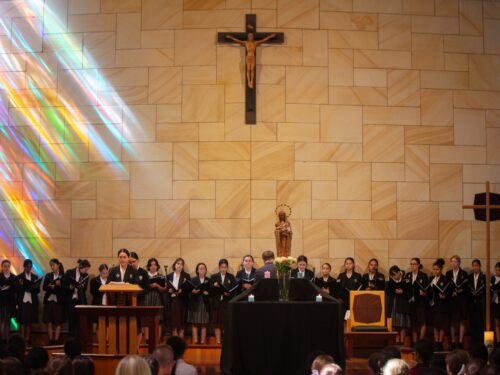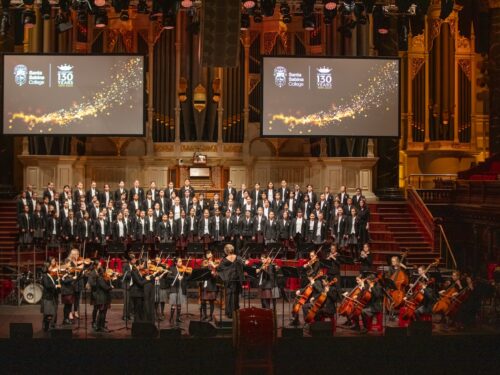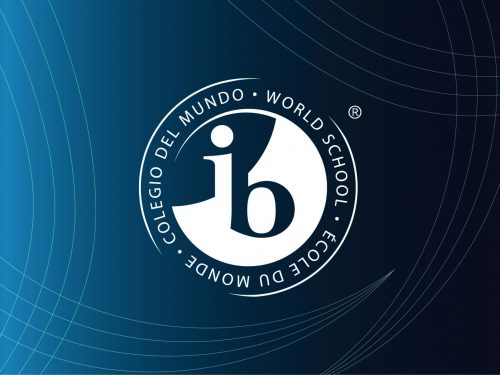Thomas Aquinas Scholars Program
The Thomas Aquinas Scholars Program supports and challenges gifted and high-potential students from Kindergarten to Year 12, providing opportunities, resources, and guidance to help them excel.
The program, based on Gagné’s Differentiated Model of Giftedness and Talent (2020), nurtures natural abilities through tailored educational experiences. Gagné emphasises that ‘systematic support, enrichment, and a stimulating environment help gifted students thrive academically and emotionally.’
Inspired by the greatest Dominican scholar, St Thomas Aquinas, the program fosters academic achievement, creative thinking, and personal growth in an inclusive and supportive setting. VanTassel-Baska (2020) highlights that ‘gifted students flourish when educators and families collaborate on meaningful learning experiences.’ Our program reflects this by strengthening partnerships between the College and families. Balancing talent development with emotional wellbeing, the Thomas Aquinas Scholars Program nurtures lifelong learning and meaningful contributions to society.
Program structure
1. STUDENT IDENTIFICATION PROCESS
The program ensures a fair and comprehensive approach to identifying gifted and high potential students:
- Screening and Assessment – Achievement, ability, and aptitude data are used to assess student potential.
- Teacher and family input – Teacher nominations and parental insights help identify talents beyond standard testing.
- Personalised Learning Plans – Surveys guide tailored learning goals, with collaboration between teachers, parents, students, and the Gifted Education Team.
2. TAILORED SUPPORT FOR GIFTED AND HIGH-POTENTIAL STUDENTS
The program provides targeted support to meet the needs of gifted learners:
- In-class differentiation – complex learning experiences and flexible grouping strategies.
- Clustered learning and small group withdrawal (Primary) – enrichment sessions focus on critical thinking, problem-solving, and independent research.
- Enrichment – opportunities for competitions, external programs, and student-led interest groups.
3. SHARED RESPONSIBILITIES
Classroom Teachers:
- Design challenging, personalised learning experiences.
- Monitor progress and provide feedback.
- Keep accurate student records.
- Engage in professional development.
Gifted Education Team:
- Supports teachers in differentiating lessons.
- Advocates for students’ academic and emotional needs.
- Maintains records and documents key discussions.
- Provides resources and workshops for parents.
Parents:
- Foster curiosity, resilience and independence at home.
- Collaborate with teachers to support learning.
- Attend workshops and engage in ongoing communication.
4. PARENT COMMUNICATION
- Initial and progress communication – discuss placement, goals, and adjustments.
- Ongoing updates – enrichment opportunities and regular feedback.
- Workshops and open communication – support strategies for parents.
5. KEY GOALS AND OUTCOMES
The program aims to:
- Inspire a love for learning.
- Develop critical and creative thinking.
- Provide academic challenges and personal growth.
- Build resilience and independence.
- Foster a community of like-minded peers.
Contacts
Jacqueline Pugh
Deputy Principal Teaching and Learning P-12
j.pugh@ssc.nsw.edu.au
Stella Azizian
Head of Primary P-6
s.azizian@ssc.nsw.edu.au
Matthew Mountford
Dean of Gifted Education 7-12
m.mountford@ssc.nsw.edu.au
Brooke Panagopoulos
Gifted Education Co-ordinator P-6
b.panagoploulos@ssc.nsw.edu.au.






